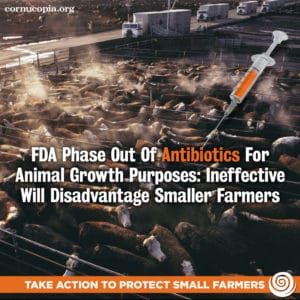On December 11, 2013 the U.S. Food & Drug Administration (FDA) released a guidance document that asks animal-drug makers to voluntarily discontinue marketing antibiotics to farmers for faster livestock growth, limiting their use strictly to therapeutic uses.
 “The outstanding question is, will this billion-dollar industry make voluntary changes in order to protect the efficacy of important antibiotics used to treat human illnesses,” said Rebecca Thistlethwaite, a farm policy analyst with The Cornucopia Institute. “Or will pharmaceutical companies resort to a public relations shell game, in order to protect profits in which no material changes really take place?”
“The outstanding question is, will this billion-dollar industry make voluntary changes in order to protect the efficacy of important antibiotics used to treat human illnesses,” said Rebecca Thistlethwaite, a farm policy analyst with The Cornucopia Institute. “Or will pharmaceutical companies resort to a public relations shell game, in order to protect profits in which no material changes really take place?”
Juan Ramon Alaix, CEO of Zoetis, the world’s largest animal pharmaceutical company, said in a recent interview, “…we (Zoetis) agree with the approach of the FDA to eliminate the growth-promotion indication of certain antibiotics which are relevant for humans in feed. But this will not have a significant impact on our revenues.”[1]
“Mr. Alaix’s statement implies that Zoetis expects minimal changes in the sales of their animal drugs and that this new FDA guidance will have little effect on the usage of antibiotics in food animals or their sales,” Thistlethwaite added. “If the pharmaceutical companies support the FDA’s proposed changes, one might suggest they may be ineffective in curbing antibiotic use.”
According to the FDA an estimated 80% of all antibiotics manufactured in this country (by weight) are administered to livestock — and most are marketed to promote weight gain and feed efficiency.
“The indiscriminate use of antibiotics in livestock has allowed meat packers to crowd even more animals into their feedlots and exert more influence over the meat supply and prices,” explained Bill Bullard, CEO of R-CALF, an independent rancher organization.
Added Cornucopia’s Thistlethwaite: “How about the FDA address the crowded conditions that spread drug-resistant pathogens throughout animal herds and flocks in the first place?”
The draft guidance (#213), written as nonbinding recommendations, calls for a voluntary three-year transition of medically important antibiotics to no longer allow their use for food-animal growth or feed efficiency purposes. According to environmental health scientists at John Hopkins Bloomberg School of Public Health, this would merely “rebrand the uses currently labeled as growth promotion as disease prevention.”[2]
So-called “sub therapeutic” administration of antibiotics, low doses of the drugs in feed and water to prevent disease, is just as likely to apply selective pressure for antibiotic resistance as sub therapeutic administration designed for production purposes — the same exact problem the FDA is purportedly trying to address with the new restrictions.
More and more antibiotic resistance is being found in dangerous and deadly bacteria around the country. Methicillin-resistant Staphylococcus aureus (MRSA) infections, for example, kill close to 20,000 people a year in the U.S. Many studies show a multitude of drug resistant pathogens on meat and poultry products purchased in grocery stores.
A recent study published in the Clinical Infectious Diseases journal found 47% of meat and poultry samples from five U.S. cities were contaminated with Staphylococcus aureus. Ninety-six percent of those samples were resistant to at least one antibiotic, and 52% were multi-drug resistant. In addition, tests conducted by the FDA every year routinely show high levels of antibiotic resistant bacteria on retail meat.
“If you get an infection and antibiotics don’t work to control it, what next?” asks Mark A. Kastel, Cornucopia’s Co-director. “That’s one of the reasons we see high mortality in victims of infections caused by MRSA strains of bacteria,” Kastel added.
As an alternative to antibiotic usage, some livestock experts suggest the best preventative strategy is to limit the number and density of animals in a facility and to create a healthier environment, such that disease does not spread so rapidly. “Prophylactic use of antibiotics props up the entire ‘factory farm’ model,” Kastel explained. “And there are many other contingent liabilities associated with industrial-scale livestock production in addition to antibiotic-resistant bacteria.”
The other major change the FDA’s draft guidance calls for is to bring the therapeutic uses of important antibiotics under the direct oversight of licensed veterinarians. While that move seems reasonable in many ways, similar to requiring a doctor’s prescription to obtain antibiotics for humans, it may disproportionately disadvantage small farmers who don’t have a regular relationship with a veterinarian.
Indeed, the Humane Society Veterinary Medicine Association finds the lack of licensed food animal veterinarians to be a major problem with the implementation of this guidance.
Andrew Gunther, director of Animal Welfare Approved, a pro-family farm livestock certifier, also finds the lack of veterinarians in many parts of the country a serious issue for family farmers. Gunther would like to see the guidance offer more flexibility, such as allowing “qualified experts like extension agents that could be able to provide animal health advice in addition to veterinarians.”
“Since The Cornucopia Institute cares about the livelihoods of independent family farms, local, organic and sustainably managed, there is a legitimate concern that farmers should continue to have access to life-saving medicines for their animals when they need them,” affirmed Thistlethwaite.
MORE:
It should be noted that if the life of an animal is in danger, or in an effort to address pain and suffering, organic farmers are required, under federal law, to administer antibiotics. Milk, meat and eggs from treated animals are not allowed to be marketed as organic and any animals treated with prohibited drugs must be immediately marked/identified and subsequently removed from the operation.
Please see Cornucopia’s action alert for more information on how the farmers and consumers can address the FDA’s guidance shortcomings.

